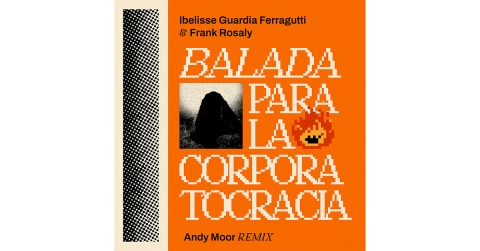Composer and bandleader Darcy James Argue and his Secret Society ensemble make their Nonesuch Records debut with Dynamic Maximum Tension, out now. The album pays homage to some of Argue’s key influences with original songs dedicated to R. Buckminster Fuller, Alan Turing, and Mae West. Cécile McLorin Salvant joins for “Mae West: Advice.” "Superb … Dynamic Maximum Tension is a delight," exclaims All About Jazz in a four-star review. The New York City Jazz Record adds: "Remarkable in its ambition, scope, and sheer length, this is Argue’s crowning achievement to date."
Composer and bandleader Darcy James Argue and his Secret Society ensemble make their Nonesuch Records debut with Dynamic Maximum Tension, out now. The album, which you can get and hear here, pays homage to some of Argue’s key influences with original songs dedicated to R. Buckminster Fuller, Alan Turing, and Mae West. Fellow Nonesuch artist Cécile McLorin Salvant, with whom Argue collaborated on her long-form musical fable Ogresse, joins the ensemble for “Mae West: Advice.” Dynamic Maximum Tension’s eleven tracks, on two CDs, also include a response to Duke Ellington’s “Diminuendo and Crescendo in Blue,” titled “Tensile Curves,” among other original songs. You can take a quick look inside the CD here:
"Superb … Darcy James Argue's Secret Society's Dynamic Maximum Tension is a delight," exclaims All About Jazz in a four-star review. The New York City Jazz Record adds: "Remarkable in its ambition, scope, and sheer length, this is Argue’s crowning achievement to date."
The album track “Dymaxion”—a portmanteau of “dynamic maximum tension”—takes its name from the term coined by architect and inventor Fuller to describe his concept of using technology and resources to maximum advantage.
Argue says of his inspiration for the music: “It feels like our culture today is headed in a profoundly dystopian direction. By engaging with figures like Buckminster Fuller, Alan Turing, and Mae West, I was trying to connect to a more optimistic time, trying to reclaim a sense of agency, trying to rekindle my faith in our ability to grab the future and shape it ourselves.”
Darcy James Argue, “one of the top big band composers of our time” (Stereophile), is best known for Secret Society, an eighteen-piece group “renowned in the jazz world” (New York Times). Argue brings an outwardly anachronistic ensemble into the 21st century through his “ability to combine his love of jazz’s past with more contemporary sonics” and is celebrated as “a syncretic creator who avoids obvious imitation” (Pitchfork).
Acclaimed as an “innovative composer, arranger, and big band leader” by the New Yorker, Argue’s accolades include multiple Grammy nominations and a Latin Grammy Award, a Guggenheim Fellowship, a Doris Duke Artist Award, and countless commissions and fellowships. His prescient 2016 Real Enemies, an album-length exploration of the politics of paranoia, was named one of the twenty best jazz albums of the decade by Stereogum. Like Real Enemies, Argue’s previous recordings—his debut Infernal Machines and his follow-up, Brooklyn Babylon—were nominated for both Grammy and Juno awards.
- Log in to post comments



